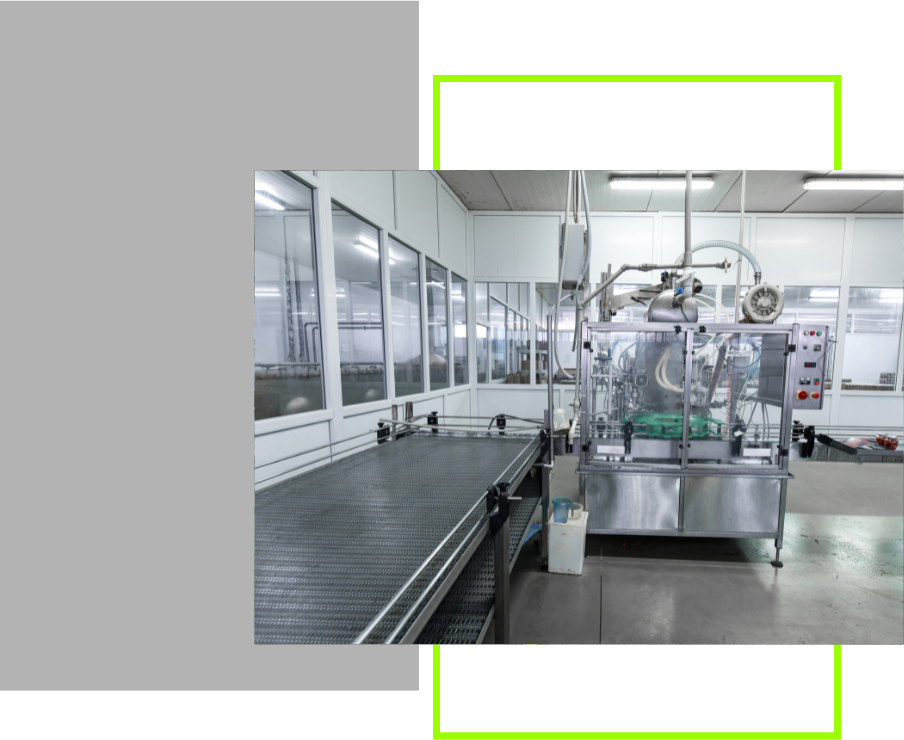
Food Processing

Food Processing
In the bustling world of food processing facilities, particularly in the dynamic environment of North Central Florida, a multitude of challenges are faced daily. These facilities are the backbone of the food industry, playing a crucial role in transforming raw ingredients into the myriad of products that fill our grocery shelves and dining tables. The complexity and intensity of operations in these facilities demand surfaces that are not only durable and resilient but also adhere to the highest standards of hygiene and safety. This is where the expertise of Spartan Coatings becomes invaluable, providing specialized coating solutions that are tailored to meet these exacting demands.
Unique Operational Demands Of Food Processing Facilities
Food processing facilities are unique in their operational requirements. These centers are characterized by a beehive of activities where raw ingredients are received, processed, cooked, packaged, and stored. Each of these steps involves different processes and equipment, creating a diverse range of environments within a single facility. Some areas may be exposed to high temperatures and steam, while others might be refrigerated or involve the use of acidic or basic substances. This variety in operational conditions poses a significant challenge when it comes to selecting the right kind of surface protection.
One of the primary concerns in food processing facilities is the maintenance of hygiene and cleanliness. The risk of contamination and bacterial growth is a constant threat, necessitating surfaces that can be easily and thoroughly cleaned. Traditional flooring and wall coverings often have seams or grout lines where dirt and bacteria can accumulate, making them unsuitable for such environments. In addition, the frequent and rigorous cleaning protocols, which often involve harsh chemicals and high-pressure washing, can quickly degrade these traditional surfaces, leading to the need for frequent repairs and replacements.
Another significant challenge is the durability of the surfaces within these facilities. The heavy foot traffic, the movement of machinery and equipment, and the constant loading and unloading of products exert considerable stress on floors and walls. This wear and tear can lead to cracks and chipping, creating unsafe working conditions and potential areas for bacteria to harbor.
Understanding The Floor Coating Process
Spartan Coatings addresses these challenges head-on with its specialized coating solutions. The polyurea and epoxy coatings, topped with a polyaspartic finish, provide a robust and resilient barrier that stands up to the rigorous demands of food processing environments.
The polyurea coating offers unparalleled flexibility and strength, making it ideal for withstanding the physical stresses of heavy machinery and equipment. Its seamless application ensures that there are no crevices or joints where dirt or bacteria can accumulate, thus maintaining the hygienic integrity of the facility. The rapid curing time of polyurea is also a significant advantage, minimizing downtime in fast-paced production environments.
Epoxy coatings complement the polyurea by providing a hard, durable surface that resists chemical degradation. This is particularly beneficial in areas of the facility where food is processed, and chemicals are used for cleaning. Epoxy's excellent adhesion properties ensure a long-lasting bond to the substrate, providing a stable and durable surface that can withstand the test of time.
The final layer of polyaspartic coating enhances the overall system by providing a UV-stable, abrasion-resistant finish. This topcoat not only extends the life of the underlying coatings but also maintains an aesthetic appeal, a factor that is often important in facilities where visibility and cleanliness are paramount.
Why Get Special Floor Coatings Installed In Food Processing Facility
The combination of these coatings creates a surface that is not just tough and durable but also hygienic and easy to clean. The smooth, non-porous finish allows for efficient cleaning and sanitation, ensuring that the facility meets the stringent standards set by health and safety regulators. In addition, the coatings are resistant to a wide range of temperatures, making them suitable for use in various areas of the facility, from high-heat cooking zones to cold storage rooms.
Spartan Coatings' approach to serving the food processing industry in North Central Florida goes beyond mere application of coatings. We engage in a consultative process with our clients, understanding the specific needs and challenges of their facility. This collaborative approach allows us to tailor our solutions to provide maximum effectiveness and efficiency. Our team of experts is equipped with the knowledge and expertise to advise on the best coating solutions for each area of the facility, ensuring that every surface, from floors to walls, is optimally protected.
The food processing industry in North Central Florida faces a range of challenges that require specialized surface solutions. Spartan Coatings, with its expert application of polyurea, epoxy, and polyaspartic coatings, offers a robust and effective solution to these challenges. Our coatings provide the durability, hygiene, and safety that are essential in these facilities, ensuring that they can operate efficiently and effectively. With Spartan Coatings, food processing facilities can maintain the highest standards of operation, meeting both their production goals and regulatory requirements. Contact us today for all of your flooring needs.
Frequently Asked Questions
Q1: How Do Coating Solutions Aid in Ensuring Compliance with Food Safety Regulations?
A1: Compliance with food safety regulations is paramount in food processing facilities. Our specialized coating solutions, comprising polyurea, epoxy, and a polyaspartic topcoat, play a vital role in this compliance. These coatings create a seamless, non-porous surface that prevents the growth and harboring of bacteria and contaminants. They are impervious to various chemicals used in cleaning processes, ensuring that the surfaces can be sanitized effectively without degradation. Additionally, the durability and resistance to wear and tear prevent the formation of cracks and crevices where contaminants might accumulate. This adherence to hygiene standards helps facilities meet the rigorous requirements set by food safety regulators such as the FDA and USDA, ensuring that the facility maintains a safe and healthy environment for food processing.
Q2: Can Coating Solutions Improve Energy Efficiency in Food Processing Facilities?
A2: Yes, our coating solutions can positively impact the energy efficiency of food processing facilities. The reflective nature of our coatings, especially when lighter colors are used, can significantly enhance the lighting efficiency within the facility. This improvement in light reflectivity reduces the need for additional lighting, thereby saving energy. Moreover, the seamless and smooth surface of the coatings provides better insulation in temperature-controlled environments, like refrigeration areas, leading to reduced energy costs associated with heating and cooling. By contributing to a more thermally efficient environment and optimizing lighting, our coatings not only improve the operational efficiency but also support facilities in their efforts to be more energy-efficient and environmentally conscious.
Q3: How Do Coating Solutions Adapt to Different Zones Within a Food Processing Facility?
A3: The versatility of our coating solutions is one of their key strengths. Our polyurea and epoxy coatings, topped with polyaspartic finishes, are formulated to perform exceptionally across a variety of environments within a food processing facility. For high-temperature areas, the coatings maintain their integrity without softening or becoming pliable, ensuring a safe and stable surface. In cold storage and refrigeration areas, they remain flexible and resistant to cracking, even in extremely low temperatures. This adaptability is crucial for maintaining a consistent and durable surface throughout the facility, regardless of the specific environmental conditions in each zone. By offering this level of versatility, our coatings ensure that every area of the facility is adequately protected and capable of withstanding the unique challenges it faces.
All Rights Reserved | Spartan Coatings

